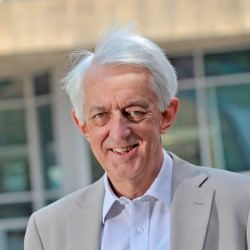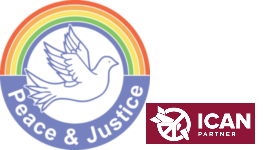On UN International Peace Day we will be holding our second Carnall Peace Award Lecture will be from Professor Paul Rogers

Global Peace & Security After Ukraine
When: UN International Peace Day, September 21 2022
Where: Augustine United Church, George IV Bridge, Edinburgh
Paul Rogers will speak for 45 minutes
This will be followed by a panel discussion and Q&A on the international implications of the war in Ukraine moderated by Professor Christine Bell, co-director of the Global Justice Academy at Edinburgh University.
Joining us via zoom for the panel discussion:
- Yurii Sheliazhenko, executive secretary of the Ukrainian Pacifist Movement and Board member of World Beyond War (on zoom from Kyiv)
- Vijay Prashad, Director of Tricontinental: Institute for Social Research, Editor of Leftworld Books and a fellow at Renmin University of China. (on zoom from Chile).
This is a free event but please register you are coming on Eventbrite
About the Carnall Peace Award
Geoffrey Carnall was known as an exceptional scholar when he was studying English Literature in 1945 at Magdalen College, Oxford, and was also already active in politics and peace activism. He had registered as a conscientious objector in 1944 and consequently served in the Friends Service Unit in India from 1948–50. There he came under the Quaker influence of Horace Alexander and explored Alexander’s Gandhian non-violence as India and Pakistan struggled on the brink of war. After India he returned to academia, first in Belfast and then in 1960 Edinburgh, where he met his wife Elisabeth Seale Carnall, founder of the Quaker Women’s Group and long standing supporter of Campaign Against the Arms Trade. Geoffrey was deeply involved in the peace movement, including direct action and a court case (which he won) on the legitimacy of leafleting people as they left the famous Edinburgh military tattoo. He and Elisabeth were renowned for their gentle and generous Quaker hospitality, and together they set up a small resource centre that has since grown into Peace and Justice Scotland. The centre was a base for the conversations and friendship that Geoffrey and Elisabeth enjoyed so much as they nurtured the project carefully until their deaths in 2015.
The legacy they left to the enterprise includes an annual award which this year we are honoured to make to Professor Paul Rogers, who will deliver the annual lecture in their name.
In 2021 we awarded the Carnall Peace Award to Yemeni human rights organisation Mwatana and held an online event featuring art and music by Shatha Altowai, Yemeni visual artist and Saber Bamatraf, Yemeni pianist and composer as well as talks by Mwatana’s chair person Radhya Al-mutawakel. Watch the event again here
In 2022 we are awarding Professor Paul Rogers the Carnall Peace Award
Professor Paul Rogers
Paul Rogers is Emeritus Professor of Peace Studies at Bradford University and an Honorary Fellow of the Joint Service Command and Staff College. He lectured regularly at senior UK defence colleges for forty years and has been an External Examiner for the MA programmes at the Royal College of Defence Studies. Paul lectures on the changing drivers of international conflict with particular interest in the Middle East and paramilitary violence, and also has a long-term research interest in the interaction between socio-economic marginalisation, climate disruption and security.
He was educated at Imperial College and then lectured there, including a two-year secondment as a Senior Scientific Officer with the East African Community. He joined Peace Studies at Bradford in 1979 and has maintained a close connection with the University since then, including periods as Head of Department and Chair of Faculty. He has also been Chair of the British International Studies Association.
Paul has written/edited 30 books and over 150 papers and book chapters. His work has been published in many languages, including Russian, Chinese, Japanese, Farsi, Polish, Portuguese, Spanish and Catalan.
Paul is a regular broadcaster on radio and TV networks worldwide and contributes to Open Democracy and to the Oxford Research Group.

